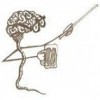Can moral responsibility exist without free will?
Assume for the purposes of this discussion that something like causal determinism is correct. Nothing is fated to happen, but everything will happen because of a prior cause, and as such everything is inevitable.
Does this remove moral responsibility?
On the topic of punishment (eg. prison time) and reward (eg. prizes or awards given for charity work), the idea moral responsibility is unaffected. If we think of punishment and reward as methods of encouraging or discouraging certain behaviour patterns, then it makes sense that we apply those to the individuals exhibiting the behaviour patterns we want to en/discourage.
Like if a toaster is broken, you'll fix it, even though it wasn't the toaster had no choice. If someone commits murder, whether their decision was the inevitable result of a prior cause or not, theirs is the behaviour which needs modifying, so they must bear the punishment.Based on the rules you established, there is no free will nor is there moral responsibility. The murder was inevitable and so is the punishment. Punishment for crimes is the necessary outcome of the chemical responses in the families/community of the victim based on how the social process evolved as part of the inevitable sequence initiated by the big bang. (Same goes for "positive" actions/rewards)
I love the way you put that! Great job and good thinking skills lol.

Very true, but isn't that akin to saying 'whatever happens, happens'? I'm talking about why these things happen, and why they remain appropriate without free will.
The definition of inevitable is that it must happen.
If I heat water it is going to boil. The steam is going to go up and condense on the hood above my stove. It will then drip off or evaporate depending on the temperature in the room which is dependent upon the air conditioning or lack thereof which was determined by my degree of comfort or my absense from the home or inability to pay the bill which was determined by whatever factor that determined it based on what came before that... all in a big chemical sequence.
If you're going to talk about "causal determinism" you must be willing to live with the nature of what you are talking about. There is nothing but an ever expanding sequence of interdependent CAUSAL events that erupt exponentially out of the Big Bang. Just because our little monkey brains can't track the complexity does not make it moral, make it Divine, make it anything than a really complicated pot of water boiling on a cosmic stove. Period.
Free will is an illusion that is chemically derived in a bio-physical neurological process in our monkey bodies, and it arose necessarily out of the events that made monkeys climb out of trees due to climate change or whatever else, and the smart one who thought he made choices won the hot monkey chick and got to make baby monkeys etc., but it's not free will it's reflex based on reactions to external stimuli that feels like "a choice" to us monkeys, but is totally in response to asstons of other stimuli that act upon our monkeyness and make us do what we think we did on our own.
Your scenario has zero room for concepts of "appropriate" or even questions of "why?" The why is because the Big Bang happend. That's why.
That's an interesting, age-old question. Philosophers maintain that "ought implies can." That is, it makes no logical sense to say that somebody should do something that they are incapable of doing.
This was the theme of the great play "The Iceman Commeth" by Eugene O'Neill which was influenced by deterministic Freudian theory.Hi friends
I think morals are an important dimension of responsibility.
Thanks
I am an Ahmadi peaceful Muslim
I think all that exists without free will is dependency and weakness.
Is it then a waste of time to try and construct a system of morals?
The problem here is that you are stepping outside your own paradigm in using such phrases as 'waste of time', which assumes a moral structure already in place and competent to define 'waste'.
Yep, Paraglider is right here. You asked a simple question, I gave a simple answer. Now you're trying to change the rules.
Yes I think you might be right. I'm sorry, these fallacious assumptions come very easily to the human mind.
Yes, but that is not the whole story. The concept of moral responsibility was a factor which helped make the punishment inevitable, so it is still a relevant concept. All you are saying is 'whatever happens, happens for a reason'. This is true, but like Aristotle's problem of the sea battle http://www.sfu.ca/philosophy/swartz/freewill1.htm#part2 (which I discovered the other day, cheers AKA Winston), saying it is inevitable doesn't relieve us of our role in making it inevitable, and the concept of moral responsibility is the way in which we do this.
"Is it then a waste of time to try and construct a system of morals?"
I don't think so, maybe if everyone was trained and depended on determinism rather than free will. With free will and morals, I could have empathy to view and contemplate your beliefs, even though I highly disagreed with them.
If I thought I was determined to see things my way with no morals or empathy to read your thoughts from an unbiased position, I could disagree and call you wrong and ignorant simply because we have different beliefs. I choose to have morals and free will.
The problem with many laws and morals is that they are set by the majority belief. Also, people aren't taught the same morals growing up. I disagree with the bible, but to have society follow the same morals, the same morals have to be taught or read. We have nothing besides religious text that attempts to create and teach morals on the large scale. Unlike the bible, the morals must not contradict or few will choose to follow them.Threaten 'em with damnation and hellfire, and you'd be amazed how much morality mankind can achieve. God can't bend us to his will, we must walk, in complete knowledge, and bend to it WILLINGLY. That is why complete knowledge is required, of course this is purely my veiw. You wouldn't buy a car w/o kicking the tires, and insisting on a test drive. and as for morals contradicting, God is God, he actually does as he pleases, so when he has told someone to violate his moral code, that moral code applies to us (for now) not to God If you believe that God is the Author of all things. Good AND evil. Damn schizophrenic teddy bear?
Thanks. That is like a father beating a mother in front of the child while telling the child not to hit women. Do as I say not as I do. Believed leaders lead by truthful example, not by contradictory statements and actions.
Like I said Schizophrenic teddy bear, don't know if he is going to bite or cuddle, but there is a line between the wholly contradictory God of the old testament and the loving forgiving God of the new testament. Consider that the mind of God exibits all of the "shortcomings" that the mind of his creation exhibits, which doesn't mean we are flawed anymore than God is. He is all we are and more. That is why he says don't lie, and then tells someone to lie. IT"S ALL IN THE PLAN. Maybe when he tells the Hebrews to go and take Canaan by force he was trying to see if they thought about those tablets at all. Explains why he doesn't seem to like them a whole lot.
This is a hypothetical statement.Thanks. If your God has everything planned down to every thought, there is no free will, only dependency and weakness. With no free will, this means your God programmed good and evil with no choice of changing or gaining more knowledge. In our society, we usually put schitzo's in mental hospitals, we don't worship them. I'm not positive, but I am pretty sure there is still killing by God, even in the NT.
Seems to me it's not a waste of time but rather a reflection of communal values which are required for people to live together peacefully and productively whether or not behavior is "determined." Our society is predicated on the assumption that, except for except for the insane, people have free will. This is practical and necessary whether or not its true or regardless of the extent to which it is true. Perhaps there is a continuum of free will with some at either end and the majority of people in the middle??
I'm pretty sure that the free will vs determinism argument is about as sensible as the liberal vs conservative one. Where there is a continuum, it is usually unwise (and very limiting) to insist on the absolute truth of either position.
The determinism associated with falling to the ground if you faint is 100%.
The determinism associated with peeing after a couple of beers gradually increases over the course of an hour or so, from 0 to 100%. Most of us exercise our free will to preserve our dignity, perhaps around the 75% mark.
The determinism associated with my choice to cite that example and to use the word 'dignity' is, and always will be, completely incalculable. Free will provides a far better description of the process.
If free will is an illusion, so too are the Gas Laws, Fluid Dynamics, Thermodynamics, etc, because they too are based on the macro behaviour of complex systems, even though technically, these systems don't exist. All are composed of billions of atoms and molecules in close juxtaposition.
All our descriptions are models, to be refined as more information becomes available. But we should not pre-empt such information by rejecting the best model we have to date. The onus is on the determinists to demonstrate how it applies, not just to state that it does.
Finally, determinism and free will can be discussed with no reference to anything supernatural. Predestination, on the other hand, really isn't worth discussing, except between believers who take as read the existence of God. To a non believer, predestination is a non-starter.I agree with most of what you wrote here. Except for, "To a non believer, predestination is a non-starter". I don't have numbers to back it up, but it seems most information I see science or psychiatry claim much if not everything is based on determinism, genes, and environment. I haven't seen many on the non believer side claim free will. I have seen more on the religious side, but many religious also claim there is no free will. Thanks
I'm using predestination as Calvin meant - preordained by God. Non-believers would first have to be convinced there was a God before they would worry about what God did/does.
Determinism doesn't require a God.Thanks. That is interesting, what is your reasoning behind determinism not requiring a God and free will requiring one?
I didn't say that. Determinism is all about initial conditions and physical 'laws'. Free will is a manifestation of consciousness. Neither requires a God, though neither can explain ultimate existence. But then neither is 'God created it' an explanation.
Why not read my hub on this? It's got to be more efficient than piecemeal in the forum!
http://hubpages.com/hub/Free-Will-Prede … -SentienceAt the age of 6 or 7 I put a pot of water on the fire and added a couple of raw eggs to the mix. I knew that in a few minutes I was goina have some boiled eggs for breakfast.
A skeptic might write a 15 page theisis on how this can be true. Prove that this can happen.
Then and even today I do not care to read that theisis.....
couldn't understand half of what might be written in it..
I just know that in a few minutes I'm going to eat some more boiled eggs.
I don't need to know everything there is to know about gravity and how it works in order to sprinkle a little salt on those eggs either.
Some things are for knowing how it happens....
Some things are for feeling how it feels.I think it's good to go through the theory yourself or by reading at least once, and top up from time to time. It's not necessary to consider the science every time you boil an egg!
It's really quite simple. "Casual Determination" is a fancy way of saying that there are consequences to every action. The idea certainly doesn't "remove" but rather "demands" moral responsibility.
Oh, and in answer to the actual title of your article, which seems unrelated to the article itself: No. Because, if there is no free will, then nobody is in control of, nor responsible for, their own actions. Not only would there be no such thing as moral responsibility, there wouldn't be a need for it either.
Related Discussions
- 27
Determinism and moral responsibility
by Dgerrimea 14 years ago
I believe that the lack of free will I perceive in the world has no real impact on our perception of moral responsibility. Accountability and punishment still play a role in deterring certain actions from being taken, and in correcting the behaviour of those who take such actions, thus making it...
- 148
Freewill and Heaven
by Jane Bovary 13 years ago
One of the many stumbling blocks non-believers face in the path of christian doctrine is accepting the notion of a loving God, for how could such a God allow such terrible suffering down here on Earth? This is commonly known as the problem of evil and is usually answered by theologians with the...
- 12
Can morality exist without a divine authority?
by fred allen 12 years ago
Can morality exist without a divine authority?Without absolutes who has the authority to establish moral boundaries? If there is no divine standard, can there be such a thing as morality or right and wrong?
- 13
Do you think religion compels morality, or does morality determine religion?
by lanablackmoor 11 years ago
Do you think religion compels morality, or does morality determine religion?Obviously the relationship is somewhat multi-directional for most people, but I'm wondering which you think is more powerful. Do people usually choose a religion that aligns with their preexisting morality? Or do they...
- 28
Does or Can Morality Exist?
by SpanStar 11 years ago
Having declared ourselves as free thinking righteous believers (meaning we understand the concept of a right and wrong).* Would curtailing shock jock radio announcer's verbal expressions over the airway be immoral?* There are those who say the death penalty is immoral, is it?* Some say not allowing...
- 11
Should People Talk Of Good Morals Without Invoking The Concept Of God?
by ngureco 8 years ago
Should People Talk Of Good Morals Without Invoking The Concept Of God?
















